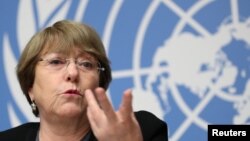The U.N.'s top human rights official warned that the rise of populist nationalism threatens many of the freedoms, rights and protections enshrined in the 1948 Universal Declaration of Human Rights.
Born out of the devastation of two world wars, the Great Depression of the 1930s, and the Holocaust, the seminal document is geared toward preventing similar disasters from happening.
December 10 marks the 70th anniversary of the declaration, which U.N. High Commissioner for Human Rights Michelle Bachelet said has withstood the test of time.
She said its fundamental principles can be applied to meet the challenges of today, such as ensuring equal rights for LGBTI people and protecting the right to life, food and health in the face of climate change.
But, she warns, many of these rights are under threat from politicians pushing a nationalistic agenda.
"When leaders… speak against migrants or a sort of hate speech or xenophobic speech, you are giving license to other people not to respect people's rights," Bachelet said.
Leaders are responsible for what they say, and must lead by example, she added, dismissing the argument sometimes made by developing countries that human rights are a Western concept.
Human rights are universal, Bachelet stressed, saying everyone must work to ensure the rights spelled out in the Universal Declaration of Human Rights are not eroded.




